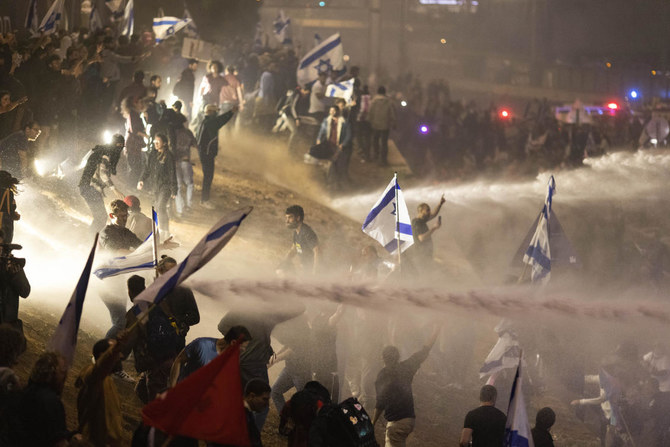JERUSALEM: Israeli Prime Minister Benjamin Netanyahu’s coalition plunged into chaos on Monday, after mass overnight protests over the sacking of his defense chief piled pressure on the government to halt its bitterly contested plans to overhaul the judiciary.
Netanyahu had been expected to make a televised statement on Monday morning announcing the plans had been suspended. But, amid reports that his nationalist-religious coalition risked breaking apart, Israeli TV stations said the statement was postponed.
Earlier, a source in his Likud party and another source closely involved in the legislation said Netanyahu would suspend the overhaul, which has ignited some of Israel’s biggest-ever demonstrations and drew an intervention by the head of state.
“For the sake of the unity of the people of Israel, for the sake of responsibility, I call on you to stop the legislative process immediately,” President Isaac Herzog said on Twitter.
The warning by Herzog, who is supposed to stand above politics and whose function is largely ceremonial, underlined the alarm that the divisions triggered by the proposals have caused.
It followed a dramatic night of protests in cities across Israel, with tens of thousands flooding streets following Netanyahu’s announcement that he had dismissed Defense Minister Yoav Gallant.
A day earlier, Gallant had made a televised appeal for the government to halt its flagship overhaul of the judicial system, warning that the deep split it had opened up in Israeli society was affecting the military and threatening national security.
During furious scenes in the Knesset early on Monday, opposition members of parliament attacked Simcha Rothman, the committee chairman who has shepherded the bill, with cries of “Shame! Shame!” and accusations comparing the bill to militant groups that want the destruction of Israel.
“This is a hostile takeover of the State of Israel. No need for Hamas, no need for Hezbollah,” one lawmaker was heard saying to Rothman as the constitution committee approved a key bill to go forward for ratification.
“The law is balanced and good for Israel,” Rothman said.
Three months after it took power, Gallant’s removal has plunged Netanyahu’s hard-right coalition into crisis as it also faces a deepening security emergency in the occupied West Bank.
In a sign of the tensions within the coalition, National Security Minister Itamar Ben-Gvir, who heads one of the hard-line pro-settler parties in the coalition, called for the overhaul to go ahead.
“We must not stop the judiciary reform and must not surrender to anarchy,” he tweeted.
The shekel, which has seen big swings over recent weeks as the political turbulence has played out, fell 0.7 percent in early trading before recovering some ground as expectations grew the legislation would be halted.
As opposition spread, the head of the Histadrut labor union, Arnon Bar-David, called for a general strike if the proposals were not halted.
“Bring back the country’s sanity. If you don’t announce in a news conference today that you changed your mind, we will go on strike.”
Israeli media reported that takeoffs from Tel Aviv’s Ben-Gurion International Airport have been suspended.
The judicial overhaul, which would give the executive more control over appointing judges to the Supreme Court and allow the government to override court rulings on the basis of a simple parliamentary majority, has drawn mass protests for weeks.
While the government says the overhaul is needed to rein in activist judges and set a proper balance between the elected government and the judiciary, opponents see it as an undermining of legal checks and balances and a threat to Israel’s democracy.
Netanyahu, on trial on corruption charges that he denies, has so far vowed to continue with the project and a central part of the overhaul package, a bill that would tighten political control over judicial appointments, is due to be voted on in parliament this week.
As well as drawing opposition from the business establishment, the project has caused alarm among Israel’s allies. The United States said it was deeply concerned by Sunday’s events and saw an urgent need for compromise, while repeating calls to safeguard democratic values.

